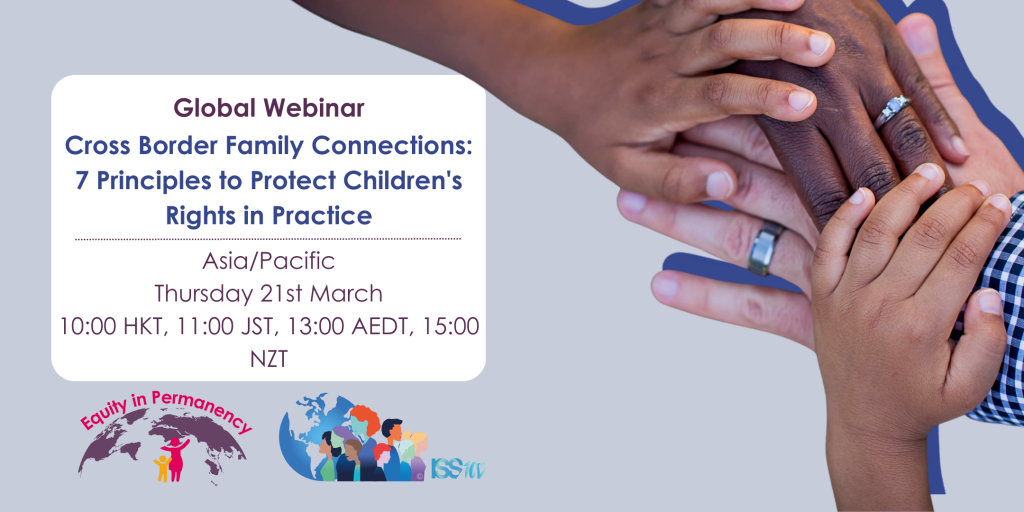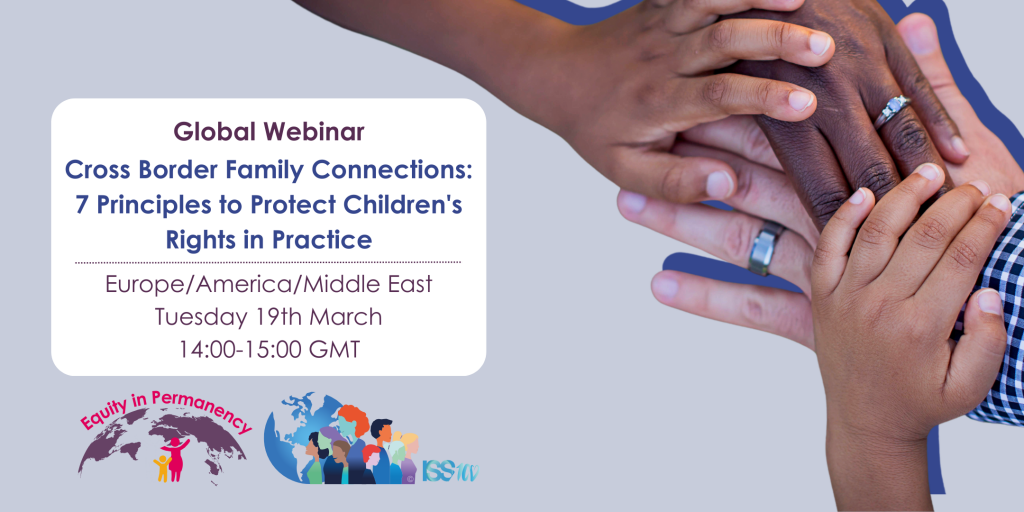

Join us for the webinar ‘Equity in Permanency’
A Global Advocacy Paper on ‘Equity in Permanency’ was recently developed by International Social Service (ISS) members in Australia, Canada, Japan, UK, and the USA, in collaboration with ISS General Secretariat. ‘Equity in Permanency’ refers to principles of child protection practice that prioritise the exploration of family placements, without discrimination of any kind, to achieve optimal long-term outcomes for the child. These principles is developed for cross-border families through the historical practice of ISS branches and members around the world.
International Social Service (ISS) was created after the First World War in 1924 in order to help unify the families that were torn apart during the war and help refugees, as well as to protect the rights and well-being of the children and families.
ISS in essence
- Is a professional andspecialised global network founded in 1924 with 132 members in 125 States;
- Has been serving, for almost 100 years, the needs of children and families;
- Contributes to law and policy development and advocacy efforts;
- Maintains a longstanding and close cooperation with the Hague Conference on Private International Law (HCCH) and its Central Authorities (CAs);
- Hosts the International Reference Centre for the Rights of Children deprived of their family (ISS/IRC), a program of the ISS General Secretariat based in Geneva, with a mission for more than 30 years to equip child protection, alternative care, and adoption professionals across the world with up-to-date research, publications, training, and technical assistance projects;
- Is always at the forefront of implementing international standards and raising awareness about children’s rights through its direct cross-border case management and advocacy efforts.
At present, ISS headquarters is in Geneva, and there are 40 different ISS branches and interim in more than 120 countries. In total, ISS network spans to 160 countries (as of April 2023).

A Global Advocacy Paper on ‘Equity in Permanency’
What is ‘Equity in Permanency’ ? – Definition
Equity in Permanency refers to principles of child protection practice that prioritise the exploration of family placements, without discrimination of any kind, to achieve optimal long-term outcomes for the child. The principles seek to empower child protection partners globally to have a child rights approach and promote policies and protocols that ensure all family placement options are explored for any child who can no longer be cared for by their parents.
Equity in Permanency: Why Now?
Child protection experts around the world widely acknowledge that those responsible for the protection of children should prioritise efforts to keep children with families and offer increased support to these placements to ensure family members are able to fulfil their care responsibilities. While the global movement of children across borders is not a new phenomenon, few protection authorities have grown in their knowledge, tools, or political will to seek family placement options in another country. Child protection practitioners may be unsure of how to abide by foreign regulations associated with securing permanency for a child, when working outside of their jurisdiction and without clear guidelines. While race, ethnicity or nationality alone cannot be an indicator of whether a child has family overseas, failing to consider these elements compromises the ability of child protection systems to seek placement options that prioritise a child’s sense
of identity, roots, language, and culture. Equitable access to kin in permanency planning and decision making must form part of a child’s rights framework. ISS, an international network providing intercountry child protection casework services, proposes the following Principles and Recommended Practices that governments should prioritise to achieve equity in permanency for cross-border families.
7 principles
1 Children’s Rights (Arts. 3, 8, 20, 21 and 30 UNCRC)
Principle
It is thechild’s right to live in a safe and stable family homeenvironment, for all decisions to emphasise the best interestsof the child, and for the child to be afforded the opportunityto maintain their identity and participate in decisions thataffect their life, permanent placement opportunities included.
Recommended Practice
Implement clear policies underpinned by a child rights approachto ensure family placements are explored and prioritised aboveother alternative care placement options or other permanent childprotection measure such as adoption. Make every effort to involveand promote the child’s voice in decisions that will affect their life.This includes carrying out best interests’ assessments anddeterminations and promote children’s right to family life andconnections to family and culture wherever they are in the world.When considering overseas placements, discrepancies in legaleffects deriving from the different forms that family placementscan take in different legislations should be addressed. This isparticularly relevant – yet not exclusive – to cross-border
kafalah
placements.
2. Equal Opportunity (Art. 9 par. 2 CRC)
Principle
Child protection systems should create equitable opportunities for families to participate in placement decisions for children who can no longer be cared for by their parents, including family members who reside overseas.
Recommended Practice
Utilise technology and alternative communication methodswherever possible to consult with family members across borderswhen considering placement decisions for children who can nolonger be cared for by their parents. This includes utilisingprofessional interpretation services as well as local professionals tostrengthen the family support system and advise on mattersrelated to immigration. In the case of a previous placement in thechild protection system, all parties involved should be given theopportunity to be heard and provide their informed consent.
3. Local expertise
Principle
Child protection systems should engage social workers or paraprofessionals in the same country as overseas family members for identification and assessments for potential placements.
Recommended Practice
Engage a local social worker or paraprofessional to conduct assessments and advise how the child could access local support services through evaluating their immigration and visa eligibility any time an overseas family member is located and expresses interest in caring for a child who can no longer be cared for by their parents. This includes consideration of legally available alternative care options in the receiving country. Contracted agencies should be experienced in child protection support with verified credentials and professional profiles. Communication between States is key and existing co-operation mechanisms such as the one set in the HCCH 1996 Child Protection Convention should be effectively implemented.
4. No Bias (Art. 2 CRC)
Principle
Child protection systems should address implicit and unconscious biases that exist amongst key decision makers regarding family placements overseas and in systems or cultures different from their own.
Recommended Practice
Promote training on systemic, individual, and implicit and unconsciousbias for professionals working at all levels. Decision makers must develop awareness of how institutional and historical practices continue to influence overseas family placements.
5. Identity (Arts. 8 and 20 CRC)
Principle
Child protection systems should prioritise a child’s access to their culture, roots, language, community, and traditional land when making placement decisions. This respects the child’s right to a robust family life and affords them the opportunity to maintain their identity.
Recommended Practice
Explore all potential placement options that enable a child to remain within their family and cultural systems, including the exploration of any potential family placement options overseas, when deemed in their best interests. This also applies to cross- border kafalah placement, where overseas solutions may have priority over national placements in case of strong family ties.
6. Adequate Planning
Principle
Child protection systems should always prepare a child for a placement with family members overseas through the development of a ‘Transition Plan’ that includes consideration of pre-placement support for carers to prepare for the child’s arrival, and local post placement follow- up and connection to resources.
Recommended Practice
Develop a comprehensive ‘Transition Plan’ with the child protection system, local professional/s, the child’s current carer and prospective carer. The ‘Transition Plan’ should include pre- placement support for carers, time-bound contingency plans agreed to by the sending and receiving authorities in the event of a placement break down, and a clear plan to safely move the child to the new home, including ensuring a suitable travel companion. Consideration should also be given to funded post-placement support and visits that assure that the various forms of care have the same legal conditions and opportunities for development.
7. Accountability
Principle
Child protection systems should improve data collection, information management and reporting systems related to children without parental care in all settings and situations to close existing data gaps and develop baselines.
Recommended Practice
Establish systems for data collection, including opportunities to gather knowledge and expertise from children and adolescents. This includes recording when and where children are placed out of their jurisdiction, across international borders. In light of the informal nature of many cross-border kafalah placements, data collection and effective monitoring across borders are of utmost importance.
Global Webinar
Global Webinar
Join us for this webinar where we will share an overview of the principles, highlighting the importance of exploring cross border family connections for children in care. We provided practical case examples on implementing the principles and invite participants to join us on a journey to embed the principles in policy and practice.

Asia/Pacific, Thursday 21st March,
10:00 HKT, 11:00 JST, 13:00 AEDT, 15:00 NZT
with Zoom Webinar

Tuseday 19st March,
14:00-15:00 GMT
with Zoom Webinar